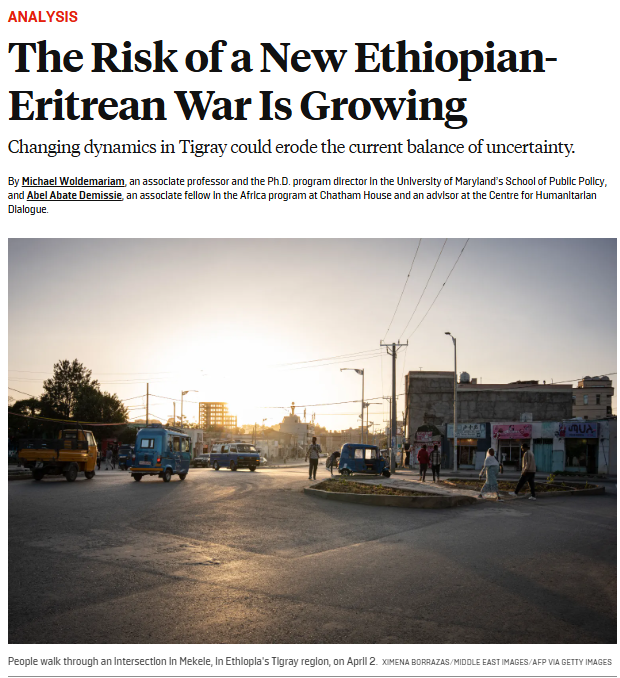
The Risk of a New Ethiopian-Eritrean War Is Growing - © ForeignPolicy
October 2025 – by Michael Woldemariam, and Abel Abate Demissie on ForeignPolicy.com
Changing dynamics in Tigray could erode the current balance of uncertainty.
For more than a year, another catastrophic war between Eritrea and Ethiopia has appeared imminent. Seasoned experts and some political figures have repeatedly raised the alarm, citing the seemingly irreconcilable differences between the leaders of the two states, escalating rhetoric, and military mobilizations as the most ominous signs.
So far, mutual uncertainty has helped keep the peace. But recent developments in Ethiopia’s Tigray region may further erode this fragile balance and trigger a conflict.
Although Ethiopian Prime Minister Abiy Ahmed and Eritrean President Isaias Afwerki had been close political allies between 2018 and 2022, the fallout of the war in Tigray and Ethiopia’s subsequent push for sea access have created a wide chasm. Ethiopian leaders have also openly questioned the legitimacy of Eritrea’s 1993 independence, and both sides have traded public allegations of ill intent and belligerence. Rumors of arms purchases and military deployments to the area of Assab—an Eritrean Red Sea port Ethiopian authorities covet—seem increasingly likely to be closer to fact than fiction.
Yet Eritrea and Ethiopia have not gone to war. This restraint has been undergirded by the fact that both Addis Ababa and Asmara lack confidence that they would prevail in a conflict. The trajectory of wars is always difficult to predict ex ante, but this is doubly so along the 620-mile Eritrea-Ethiopia frontier. Both sides have waged wars in recent memory that have not gone according to plan. The responses of critical international actors including the United States and the Gulf remain hard to forecast, and political flux in Tigray has made it impossible to assess how this critical swing actor might position itself when the shooting starts.
Now, new dynamics are increasing the risk of war. The growing proximity between Tigray’s governing class and Eritrean authorities is accelerating a major confrontation. Only de-escalating tension between Addis Ababa and Tigray, and finding mutually agreeable pathways to enhance Ethiopian port access, can sustainably reduce the risks of war.
The outcome of a potential war between Eritrea and Ethiopia is wildly uncertain. This reality is not lost on leaders in Addis Ababa and Asmara, even as they project confidence. Within living memory, key decision-makers on both sides of the border have embraced wars that took unexpected turns and ultimately proved disastrous.
Amid limited border clashes with Ethiopia in 1998, Eritrean officials surmised that they could deter and even defeat an Ethiopian military escalation. The resulting two years of total war culminated in Ethiopian troops breaking Eritrean defensive lines, occupying much of the western portion of the country, and forcing Asmara to accept unfavorable terms for peace. Similarly, Ethiopia’s 2020 attempt to put down an armed rebellion in Tigray—with active support from the Eritrean government—quickly turned into a quagmire: By the summer of 2021, Addis Ababa had lost control of Tigray, and Tigrayan forces were racing southward into government-held territory. Parallel counterinsurgency wars in the Amhara and Oromia regions have also gone awry, although perhaps not as spectacularly as in Tigray.
The international context adds to the uncertainty. In an era of dramatic global reordering, neither Addis Ababa nor Asmara can be sure of where the balance of international support—diplomatic and material—will ultimately fall.
The full article here: https://foreignpolicy.com/2025/10/21/ethiopia-eritrea-tigray-horn-east-africa/